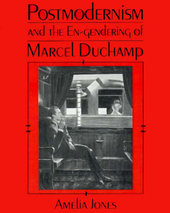
|
Postmodernism and the En-Gendering of Marcel Duchamp
Paperback / softback
Main Details
| Title |
Postmodernism and the En-Gendering of Marcel Duchamp
|
| Authors and Contributors |
By (author) Amelia Jones
|
| Series | Cambridge Studies in New Art History and Criticism |
|---|
| Physical Properties |
| Format:Paperback / softback | | Pages:340 | | Dimensions(mm): Height 238,Width 190 |
|
| Category/Genre | Theory of art
Individual artists and art monographs |
|---|
| ISBN/Barcode |
9780521456548
|
| Classifications | Dewey:709.2 |
|---|
| Audience | | Professional & Vocational | |
|---|
| Illustrations |
51 Halftones, unspecified
|
|
Publishing Details |
| Publisher |
Cambridge University Press
|
| Imprint |
Cambridge University Press
|
| Publication Date |
25 August 1995 |
| Publication Country |
United Kingdom
|
Description
A critical analysis of postmodernism in the visual arts since the 1960s, this book focuses primarily on American texts that reference and construct Marcel Duchamp as the originator of postmodern art. Amelia Jones contends that Duchamp, through his 'readymades', (the standard terms used to describe Duchamp's works) has paradoxically served in a paternal role for post-1960s American artists, critics and art historians, who have attempted to construct a new tradition of artistic practice that counters the masculinist ideologies of Abstract Expressionism and Greenbergian modernism. Adapting feminist, psychoanalytic and Derridean conceptions of interpretation as an exchange of sexual identities, Jones offers highly charged readings that focus on the eroticism of Duchamp's works and on his theories of artistic production. She reconstructs Duchamp as an indeterminably gendered author whose gift to postmodernism might best be viewed in terms of the potential of his readymades to destructure the contradictory notions of sexual difference and subjectivity.
Reviews'Jones has brought Duchamp studies to a point beyond their customary restriction to a historicist assimilation of the object to an institutional critique ... to save Duchamp one has to separate him from Warholism and conceptualism ... and Jones has done so.' Art and Text 'Jones' book serves an important function in demonstrating that even if Marcel Duchamp has entered the art-historical canon, he can never be comfortable there, and more importantly, his art will always subvert it from within.' Art in America
|